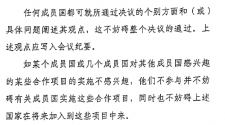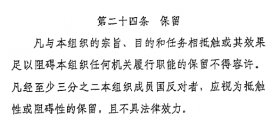View attachment 132614
View attachment 132615
article 16,
resolution is passed if no member object (consensus), except resolution is to expel a member. When expelling a memeber, the resolution is passed if no other members object.
Members may have their reservations recorded in resolution. Memebers reservation to certain aspect of a resolution does not prevent resolution being passed (provided no objection) and implemented.
View attachment 132613
Article 24, reservation.
Reservation that is against the spirit, purpose and tasks of SCO, or effectively hinderring the execution of SCO's tasks is NOT permitted. Such reservation is seen as void if 2/3 of members object.
To summarize,
- SCO has provisions to expel non-cooperative memebers.
- There is no real veto in SCO, ultimately it is 2/3 majority rule. The "veto" in SCO is like the presidential "veto" in US that can be overridedn by 2/3 majorities in congress and senate. This is not the kind of veto in UNSC.




